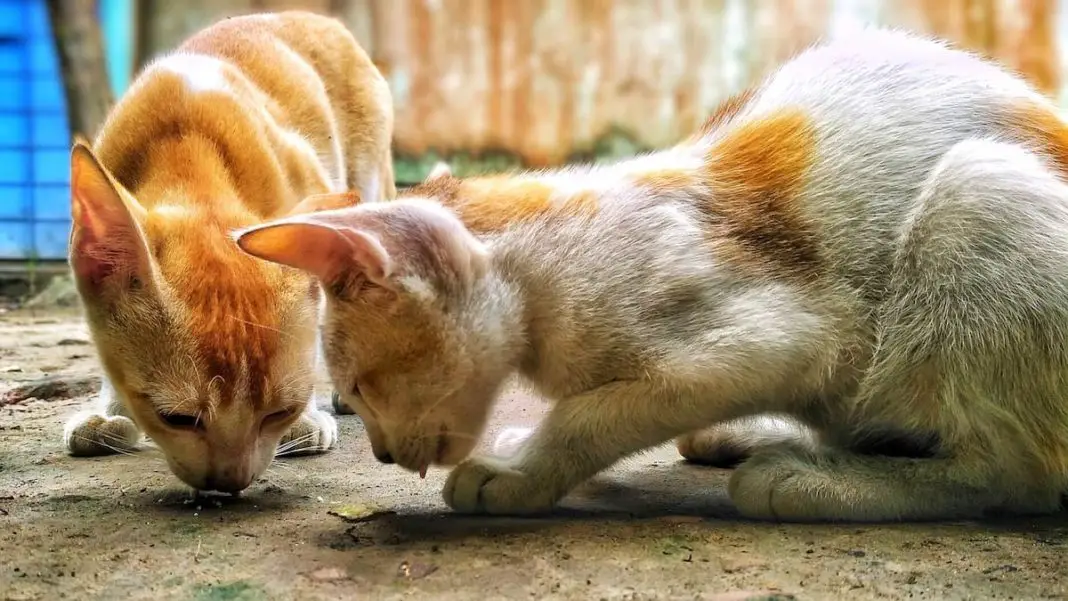Contents
- Why Is My Kitten Always Hungry?
- A Kitten Needs To Eat More Often
- Is Your Kitten Under 6 Weeks?
- What Are You Feeding Your Kitten?
- Keep Track Off Your Kitten’s Weight
- Is Your Kitten Eating More Out Of Boredom?
It’s no surprise that your kitten needs proper and balanced nutrition to help their growing bodies, but if you’ve ever found yourself wondering, “Why is my kitten hungry all the time?” then let us take a closer look into a kittens eating patterns.
Why Is My Kitten Always Hungry?
Kittens are grazers who snack throughout their day. It’s important to note that kittens will eat as much as they want and are considered very difficult to over-feed a kitten. Do you let your kitten have access to food 24/7? If not, then it may be a good idea to let them have access to their food, otherwise, you could find yourself having to fill their food bowl often throughout the day!
It’s important to know that every kitten has a different metabolism. It’s a good idea to ask your veterinarian for guidance on determining your kitten’s ideal body weight. Your vet may suggest how to adjust your kitten’s meal plan to make sure that they’re getting enough nutrition.
A Kitten Needs To Eat More Often
A new kitten owner may be surprised by how much their kitten eats throughout the day, but did you know that kittens need roughly twice the nutrients of an adult cat, which is needed to meet their growth and energy needs.
Obviously, their tummies won’t handle large quantities of food. Therefore, much like human babies, they need more frequent feedings at a younger age. This will gradually taper off as they grow. It is important during this time to weigh your kitten regularly. Doing this will help to ensure that they’re gaining regularly, but not becoming overly fat. A kitten’s hunger will usually be a pretty good guideline for determining if they are getting enough nutrition.
Is Your Kitten Under 6 Weeks?
As a general rule, it’s best for kittens under eight weeks old to remain with their mother. If this isn’t possible, then a kitten may be bottle-fed as early as two weeks old. Alternatively, a kitten can, at five weeks, be gradually introduced to good canned kitten food, mixed with equal parts of a kitten formula like KMR. (Kitten Milk Replacer). Note: it’s not advised to give a kitten whole milk, as many cats can be allergic to it. As a kitten approaches six weeks old, the amount of KMR can be gradually reduced, until the kitten can eat the canned food on its own.
At 6 Weeks: Three or smaller feedings, and should be spaced out regularly throughout the day. Be sure to weigh the kitten often and record their weight in a dated chart to help keep track of their development.
At 12 Weeks: Increase the amount in each meal, gradually spacing the meals out to three meals a day.
At 6 Months: You can gradually space the meals out to twice a day.
What Are You Feeding Your Kitten?
You should not be surprised to know that kittens are much needier than adult cats and often have much higher energy needs. In those first few weeks of their lives, a kitten will grow rapidly along with having higher activity levels. Of course, all that growth needs to be supplemented with good quality nutrients.
To meet their high-energy needs, your kitten will need to eat 2-4 times a day. It’s recommended for a kitten to have around four balanced meals per day. You can often find special portioned kitten foods at any good pet store – some brands can even save you some trouble by providing carefully measured and ready-to-go meals. Either way, those four daily meals need to be packed with all the healthy bits. Kittens need those good fats and fatty acids, along with lots of proteins, vitamins, and amino acids. All these ingredients are important for supporting healthy development and can keep up pace with your kitten’s quick growth.
Keep Track Off Your Kitten’s Weight
How quickly your kitten grows is important. You don’t want a kitten gaining weight too quickly, or for too long, as this can create lifelong problems. Not gaining adequate weight or a failure to feed appropriate nutrients will also be trouble in later years. It’s good to get into the habit of regularly weighing your cat. Your vet will weigh your kitten during each visit. You can consult your vet about your kitten’s growth curve and how your kitten is progressing. A growth curve that becomes too steep could lead to obesity, while a flatter curve could mean unhealthy development. After about 9 to 12 months of age, it’s recommended to weigh your cat at home at least every 6 months, keeping a record of it. An easier way to weigh your cat is to weigh yourself, then weigh yourself and your cat, and take the difference off. Although it won’t be as accurate as feline-specific scales, you’ll be able to spot a trend in weight gain. If you see that your cat has added an extra pound, call your veterinarian for further feeding advice.
There are many easy tips and tricks you can learn to better care for your kitten. One of the most important decisions you can make for your kitten each day is what you feed it. Think outside of the food bowl, try to educate yourself as best as you can, and develop a close relationship with your local veterinarian. Not every kitten is the same, every kitten is unique and has specific lifestyle and nutritional needs. Working closely with your veterinary healthcare team, you can create lifelong, healthy habits that work for both you and your cat.
Is Your Kitten Eating More Out Of Boredom?
Some older kittens are better than others when it comes to cutting themselves off from food when they’re no longer physically hungry. So, they’re not so different from us humans, as some bored house cats/kittens have been known to snack purely out of boredom. Unfortunately, snacking when they aren’t really hungry could lead to a host of medical conditions, like obesity, osteoarthritis, urinary problems or diabetes mellitus. According to the Cornell Feline Health Center, cats that are obese are twice as likely to pass away when they’re middle-aged (that’s ages 6-12 for cats) compared to cats with a healthy diet and weight. So, with this in mind, it’s important to keep your kitten occupied with activities other than taking another trip to the food dish would be a smart move on your part and well worth the effort in the long run.
Although originally used in zoo settings, food puzzles could be a great way to stimulate your young kitten, which helps to mimic an environment nature selected them for. Making your kitten work for their food can not only improve their health, but it can also decrease unwanted behavior that can often arise out of boredom, for example, anxiety and destructive behaviors.








